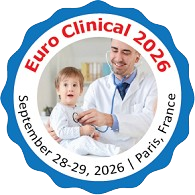Call for Abstract
Scientific Program
21st European Congress on Clinical Pediatrics and Child Care, will be organized around the theme “Innovations in Pediatric Care: Shaping the Future of Child Health and Well-being”
Euroclinical-2026 is comprised of keynote and speakers sessions on latest cutting edge research designed to offer comprehensive global discussions that address current issues in Euroclinical-2026
Submit your abstract to any of the mentioned tracks.
Register now for the conference by choosing an appropriate package suitable to you.

